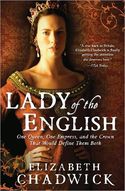
 Many thanks to Fresh Fiction for inviting me to blog.
Many thanks to Fresh Fiction for inviting me to blog.
Among other things, LADY OF THE ENGLISH is about two women and the struggle for the English crown that came to be a defining part of their lives. The better-known of the two, Empress Matilda was the daughter of King Henry I and his only legitimate heir. The English crown was promised to her, but when her father died, her cousin Stephen seized the initiative and the crown and left Matilda out in the cold. She was determined to claim her rights and set about a campaign both military and diplomatic to regain her throne.
The other lady is Adeliza of Louvain, second wife to King Henry I. She was Matilda’s stepmother even though Matilda was older than her by a couple of years. The women had much in common and would have known each other well. Unlike the Empress Matilda, Adeliza has been overlooked by history, but her story is one of quiet courage that deserved telling. Without her helping hand, Henry II might never have come to the throne.
Adeliza was the daughter of Godfrey of Louvain, duke of Lower Lotharingia, now part of Belgium. She married Empress Matilda’s father King Henry I in January 1121 when she was about 18 years old. Henry I’s first wife had died a few years earlier. Henry had more than 20 bastards to his name, but only two legitimate children – William, heir to the throne, and Matilda, who was married to the Emperor of Germany. William drowned in November 1120 when the White ship sank while returning from Normandy to England and Henry found himself without an heir other than Matilda, far away in Germany. He had been negotiating with Godfrey of Louvain for Adeliza’s hand and now swiftly married her. The chroniclers say that Adeliza was beautiful. She was known as ‘The Fair Maid of Brabant’ and was descended from Charlemagne. Around the time of her marriage to King Henry, she was elected ‘Lady of the English’ which was an honorary title given to all queens of England – and the reason for the title of the novel. Henry, took his new bride everywhere with him, but despite their closeness Adeliza remained barren throughout their 15 year marriage and we know from existing letters that it was a source of great distress to her.
Adeliza was a conscientious sponsor and benefactor of friends and relations. Her brother Joscelin was her constable at Arundel and she gave him lands and arranged a good marriage for him. She helped her cousin Melisende with a marriage portion too. Her household was stable and long serving. Her chaplain was called Herman, her clerk Serlo, and her constable Godeschal. Adeliza was also interested in religious foundations. She founded leper hospitals at Wilton, Arundel and Castle Rising and was generous to numerous religious establishments. Adeliza was well educated and enjoyed literature. She commissioned an account of Henry’s reign to be set to music which has sadly been lost. She also commissioned a bestiary and was a patron of poets.
When Henry died in 1135, Adeliza entered the nunnery at Wilton and for a couple of years, retired from the world. However, when William D’Albini, came courting, she agreed to marry him. The D’Albini’s were royal stewards and held an important place at court. William D’Albini had supported Stephen for the throne rather than Henry’s daughter Matilda.
In September 1139, about a year after their wedding, the Empress was preparing to come to England and fight for her throne. Stephen ordered a watch put on all the ports, but Matilda eluded him and landed at Arundel. Although not a port, it had a river connection to the sea. Several chroniclers believe that Adeliza invited Matilda there. I believe that she did and used the tradition and sacred bond of the kinship tie both as a pretext and a genuine reason. As Matilda’s stepmother she had certain duties and obligations. One of the roles of a queen was that of peace-maker, so perhaps Adeliza thought she could broker some kind of peace deal between Stephen and Matilda. What her husband thought of this is not reported, but he went along with it, which suggests, given his otherwise loyalty to Stephen, that he was prepared to indulge his wife – she must have been a woman of rare ability. Stephen came hotfoot to Arundel and the Empress was escorted from the castle to Bristol. From there the war began in earnest. As a cordial visit from kin and as a diplomatic exercise, Adeliza’s ploy was a disaster, however a total success in giving the Empress the landing place she needed.
Adeliza had been barren when married to Henry I, but her union with William D’Albini proved to be the opposite and between 1139 and 1148, she bore at least 6 children. Why she was so fertile with her second husband and not her first is a mystery. Henry I was certainly not incapable even in his later years.
William D’Albini was a great builder. His most famous project is Castle Rising in Norfolk where he built a fine keep for his beautiful, royal wife, gracing it with a magnificent entrance hall, rich external decoration and every comfort in the domestic quarters. Castle Rising is thought to be the first castle in England with separate Ladies and Gents latrines in the private chamber!
Adeliza eventually ended her days at the Benedictine convent at Afflighem, of which her family were patrons, but her body was brought to Reading Abbey, where she was buried as a queen beside Henry I. Her husband survived her by another twenty five years and did not remarry.
I have found her so interesting to research, and I hope readers enjoy my take on her in LADY OF THE ENGLISH.
To comment on Elizabeth Chadwick’s blog please click here.


No Comments
Comments are closed.